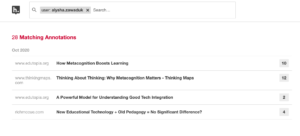Ask my classmates, my partner, or anyone else I know who happens to need to do any sort of collaborative work online, whether that be for work or school, and they will tell you how much I have raved about Hypothesis to them lately.
Hypothesis seems like a very simple tool. And it is. Which is part of my I like it so much. You simply create an account, download the plugin, turn it on when you need it, and highlight and annotate away. The Hypothesis website saves a list of pages you’ve annotated, so there’s no concern about losing track of what you’ve annotated:

I can use Hypothesis for things I would normally do anyway, like highlight and annotate readings for school. Using hypothesis with others in my classes, or if I were working on a project remotely with another person, would significantly cut down on exchange time. I have already had one class where an instructor had us make nots in a Google Doc about a reading, something for which many of us had probably made individual notes that we were then transferring elsewhere to provide others access to our thoughts. This situation would have been made a lot easier if we had all simply annotated using Hypothesis while we read — we wouldn’t need a separate document, we wouldn’t have to spend the time transferring notes, etc. We all could have reviewed each other’s annotations before our synchronous class time, which would have allowed far more time for discussing our various viewpoints and remarks.
I can imagine many other scenarios where Hypothesis would be helpful. Any collaborative assignments where collective marking up of a document would be made easier with Hypothesis.
Hypothesis allows Active Participation in Discourse Communities
Beyond ease, I think Hypothesis offers the opportunity to do something crucial for deep learning in high school classrooms — dialogue. We often ask students to read things on their own with no interaction or exchange with other students. Would it not be more helpful for their learning to encourage discussion of concepts and ideas with their peers while engaging with material? I believe students would probably be more prepared for class, particularly if it involves group discussion, if they have this type of engagement in their individual learning sessions.
Moreover, this could provide students insight into how other students organize, read, analyze, operate, etc., which I think could help teach students less confident in their reading and analytical skills through either conversation with their peers or simply through seeing how other students deconstruct text. This could encourage important metacognitive questions. Asking questions like “what do others find important? how do they determine what’s important? how do they connect this to other concepts we are learning? how do others understand this material?” can help facilitate important metacognitive engagement, helping to teach students to then ask questions like “what do I find important in this text and why? how did I determine that? how can I connect this to other concepts I am learning or already know? how can I understand this material?”. In other words, it can make the metacognitive processes of others visible, providing a model for those who are perhaps less practiced or confident with metacognition.
Further, using digital annotation for collaboration and discussion provides more information to teachers about their learners and their metacognitive processes. This can be useful for not only allowing teachers to monitor student progress, understanding, engagement, etc. but also for allowing all students’ ideas and perspectives to have a voice in the class, even if some students are not comfortable being vocal in the actual classroom. Students may pick up on things in texts that teachers didn’t or that they didn’t expect students to pick up on, providing valuable information about where students are at and, therefore, information about where lessons should or could go.
And none of this is hypothetical (PUN VERY MUCH INTENDED) — there is research that backs up all of the things I just speculated about (e.g. see “Making Reading Visible: Social Annotation with Lacuna in the Humanities Classroom“. No, I did not read this article, steal its ideas, and improperly attribute — I speculated all on my own and then found that article).
I can easily imagine, in my future social studies classroom, having students use Hypothesis to engage not only in primary research. Primary source analysis and primary research are often quite challenging for students when first introduced — facilitating analytical collaboration among students, who will have varying levels of comfort with such analysis — would benefit from learning from and teaching others about this difficult process. Hypothesis also broadens the number and type of texts students can engage with collaboratively. It can also facilitate the storing and sharing of ideas on texts that students encounter independently. If a student happens upon an interesting article and decides to annotate, that will be saved in their list of annotations — they can then easily direct other students to that resource if it’s helpful for others, or it’s easily stored with annotations in a place that student can come back to later if they need that resource for an assignment, project, etc.
Now please watch a video I made showing just how easy it is to use Hypothesis on Hypothesis’s website (how meta)
Leave a Reply
You must be logged in to post a comment.